Immediately get Chapter Wise Karnataka 2nd PUC English Quick I Believe that Books will Never Disappear Questions and Answers, Notes, Summary Pdf Download. All Karnataka 2nd PUC English Textbook Answers and Key Points Pdf is provided along with the Questions and Answers. Every Karnataka Secondary Education Examination Board 2nd PUC Chapter wise Questions are given with a clear explanation. Step by Step guide is provided to learn complete KSEEB 2nd PUC English Subject. Each Karnataka 2nd PUC English Chapter is divided into subtopics for a better understanding of a student. Every KSEEB 2nd PUC English chapter wise Solutions are given with clear explanations from starting to end of chapters. Karnataka Board Solutions for 2nd PUC English Chapter 9 is for free of cost.
Karnataka 2nd PUC English Textbook Answers Springs Chapter 9 I Believe that Books will Never Disappear
KSEEB 2nd PUC English Chapter 9 PDF has all related questions, answers, Reading Comprehension, Sentence Improvement, Grammar, etc. Practicing on a daily basis with Karnataka 2nd PUC English Solutions PDF will help to improve your English learning strength. Improve your level of accuracy to answer a question by practicing with Karnataka Secondary Education Examination Board 2nd PUC Chapter 9 I Believe that Books will Never Disappear PDF. Complete Karnataka 2nd PUC Chapter Wise important notes & quizzes are given in PDF format to help students.
I Believe that Books will Never Disappear Questions and Answers, Notes, Summary
I Believe that Books will Never Disappear Comprehension I
Question 1.
‘I was educated more by my father’s library’ says Borges. He means ______
a. school or the university did not educate him.
b. he was educated in his father’s library too.
c. he learnt through private tuitions held in his father’s library.
Answer:
(b) he was educated in his father’s library too.
Question 2.
Why did Borges feel guilty about his mother?
Answer:
His mother’s dedication to nurturing him was immense. He had misused her love as he had taken her for granted and never gave her his love and affection in return.
Question 3.
According to Borges, blindness is ______
a. just a physical handicap
b. not a misfortune
c. actually a resource.
Answer:
(c) actually a resource.
Question 4.
Why does Borges prefer to believe that he is not blind?
Answer:
He believes in optimism than pessimism. If he were to believe that he was blind, it would affect his future but if he takes it positively and uses it as raw material, it helps his future. Hence he believes in optimism.
Question 5.
Borges feels that when we read a book what matters is not the author’s intention, but what sense we get out of it. (True/False.)
Answer:
True.
Question 6.
How, according to Borges, does the book go beyond the author’s intention?
Answer:
According to Borges, in every book, there is a need for something more, which is always mysterious. A book can be full of errors; we can reject its author’s opinions; disagree with him or her, but the book always retains something sacred, something mortal, and something magical which brings happiness. Thus, the book goes beyond the author’s intention.
Question 7.
When does the poetic act happen, according to Borges?
Answer:
According to Borges, the poetic act happens when the poet writes it and the reader reads it.
Question 8.
What cannot be defined without oversimplifying it?
Answer:
Poetry is something so intimate and essential that it cannot be defined without oversimplifying it.
Question 9.
Which is the most astounding invention of man?
Answer:
‘Book’ is undoubtedly the most astounding invention of man.
I Believe that Books will Never Disappear Comprehension II
Question 1.
Why does Borges feel remorseful after his mother’s death regarding his relationship with her? Can this experience be generalized?
OR
How does Borges describe his mother and his feelings for her in his interview?
Answer:
During the course of his interview with Alifano, Borges tells him that his mother was an extraordinary person who showed him a great deal of kindness in his life. Then he confesses in a remorseful tone that he could not make his mother happy because he himself was not a happy man. He also confesses that he should have shown a better understanding of his mother.
This experience can be generalized because what Borges says is true of all children. It is not surprising to know, when their mothers die, most children express that they had taken their mother for granted while they were alive like they do with the moon or the sun or the seasons and are guilty that they had abused their mothers.
Question 2.
How does Borges elaborate on Goethe’s words, ‘ail that is near becomes far’?
Answer:
While giving his observations about ‘blindness’, Borges recalls an idea he had expressed in one of his poems. He had said that humiliation, misfortune, and discord were given to us so that we may transmute them, and make from the miserable circumstance of our life ‘eternal works’. At this juncture, Borges recalls to mind a statement made by Goethe. It says, “All that is near becomes far”. In this statement, Goethe refers not only to the sunset but also to life. Borges says that in his case, the visible world has moved away from his eyes forever. He feels that it is his duty to accept his misfortune and as far as possible enjoy those things.
Question 3.
What, according to Borges, should one think of humiliations and misfortunes?
Answer:
Borges says that all persons must think that whatever happens to him or her is a resource. He adds that all things have been given to us for a purpose, and therefore we should think of our humiliations, misfortunes and embarrassments as raw material like clay so that we may shape our art. He says that humiliation, misfortune and discord were given to us so that we may transmute them, so that we may make from the miserable circumstance of our life eternal works or works that aspire to be so.
Question 4.
What are Borges’views on poetry and poem?
Answer:
Borges believes that poetry is something so intimate and so essential that it cannot be defined without oversimplifying it. Then he says that poetry is not the poem and opines that a poem may be nothing more than a series of symbols. Borges opines that poetry is the aesthetic act that takes place when the poet writes it and when the reader reads it. He believes that poetry is a magical, mysterious and unexplainable – although not an incomprehensible – event. He believes that one should feel the poetic event upon reading it otherwise the poet should be deemed to have failed.
Question 5.
Why is it important for poetry to use language precisely? With what example does Borges demonstrate this aspect of poetic language?
OR
Finding precise words is important in the art of poetry. How does Borges justify this in his interview? ‘
OR
To what extent is finding the precise words important in the art of poetry, according to Borges?
Answer:
Borges feels that poetry needs to use language precisely. He opines that only precise words elicit the emotion. In order to prove his point, he quotes a line from Emily Dickinson, ‘This quiet dust was gentlemen and ladies’. He argues that though the idea is banal the poet is referring to a place which had been visited by men and women in ‘summer’. These people are now dead and the dust she refers to is the dust of death. Instead of saying ‘This quiet dust was gentlemen and ladies’ if the poet had used ‘men and women’, the poem would have failed as poetry. It would have sounded trivial.
Question 6.
In spite of modern modes of communication, Borges believes that books will not disappear. Illustrate.
OR
Why does Borges say that books will never disappear?
OR
Answer:
‘The modem developments in communications will not replace books.’ Explain with reference to Jorge Luis Borges’ thoughts on this.
Answer:
According to Borges, among the many inventions of man, the book is undoubtedly the most astounding of all. All others are extensions of our bodies. The telephone is the extension of our voice, the telescope and the microscope are extensions of our sight and the sword and the plough are extensions of our arms. Only the book is an extension of our imagination and memory. Modern modes in communications have not developed anything to work as a substitute for our imagination and memory.
I Believe that Books will Never Disappear Comprehension III
Question 1.
‘Poetry is magical, mysterious, and unexplainable’. How does Borges explain the strange aspect of poetry?
OR
What are Borges’s views on poetry?
Answer:
According to Borges, poetry is an aesthetic act; and poetry is not the poem. The poetic act takes place when the poet writes it and the reader reads it and it always happens in a slightly different manner. When the poetic act takes place, Borges believes that we become aware of it. That is why he calls poetry as a magical, mysterious, and unexplainable event. If one does not feel the poetic event upon reading it, Borges opines that we need to conclude that the poet has failed.
Question 2.
How does Borges value literature? Why is it important for the future of mankind?
Answer:
According to Borges, a book is only an extension of our imagination and memory. We get access to literature through books. Literature is a dream, a controlled dream. Borges believes that we owe literature almost everything we are, what we have been, and what we will be. Our past is nothing but a sequence of dreams. He believes that there is no difference between dreaming and remembering the past. It is books that serve as the repositories of great memories of all centuries and nothing else can replace books. Therefore, if books disappear, surely history would disappear and along with history man would also disappear. Therefore, literature is very important for preserving the future of mankind.
I Believe that Books will Never Disappear Additional Questions and Answers
I. Answer the following questions in a word, a phrase, or a sentence each:
Question 1.
Mention any one of the things that Borges continued to do even after becoming blind.
Answer:
Borges continued to buy books and went on filling his house with books, even after becoming blind.
Question 2.
When, according to Borges, would history and man disappear?
Answer:
According to Borges, man and history would disappear if books disappear.
Question 3.
Which was the first book that Borges read?
OR
Which was Borges’s first literary reading in an English version?
Answer:
Grimm’s ‘Fairy Tales’ in an English version.
Question 4.
Who is the writer of the verse ‘AUes Nahe Werd Fern’?
Answer:
Goethe (Johann Wolfgang Von Goethe).
Question 5.
What does ‘Alles Nahe Werd Fern’ mean?
Answer:
‘All that is near becomes far’.
Question 6.
Which famous library does Borges visualise in his dream?
OR
Which library was said to be attacked by flames in the dream of Jorge Luis Borges?
Answer:
The Royal Library of Alexandria in Egypt.
Question 7.
When is a poet considered a failure?
Answer:
A poet is considered a failure if one does not feel the poetic event upon reading it.
Question 8.
What elicits the emotion in a poem?
Answer:
Precise words.
Question 9.
Name the metaphors that Borges considers essential in literature.
OR
Mention the metaphors listed by Borges as essentials.
OR
Mention any one of the essential metaphors which, according to Borges, is found in all literature.
Answer:
Borges considers
- Time and a river
- life and dreams
- death and sleep
- stars and eyes, and
- flowers and women as metaphors essential in literature.
Question 10.
What would happen if books disappear?
Answer:
If books disappear, surely history would disappear and along with that men would disappear.
Question 11.
What strange dream did Borges have?
OR
What does Borges dream of one night?
Answer:
Borges dreamed of the burning of a great library.
Question 12.
What should a writer or an artist transmute in order to create eternal works?
Answer:
According to Borges, we must transmute our humiliations, our misfortunes, and our embarrassments, to create eternal works.
Question 13.
Which library does Borges visualize in his dream?
OR
Mention the name of the library which was attacked by countless volumes of flames in the dream of Borges.
Answer:
The library of Alexandria in his dream.
Question 14.
According to Borges, the telescope is the extension of our
(a) sight
(b) voice
(c) arms.
Answer:
(a) sight.
Question 15.
How does Borges look upon blindness?
OR
Borges looks upon blindness as a
(a) way of life
(b) miserable circumstance
(c) major handicap.
Answer:
Borges looks upon blindness as a way of life.
Question 16.
Whom does Borges look upon as an intelligent and gracious woman?
Answer:
Borges looks upon Dona Leonor, his mother, as an intelligent and gracious woman.
Question 17.
What was Borges’first literary reading?
Answer:
An English version of ‘Grimm’s Fairy Tales’ was Borges’ first literary reading.
Question 18.
Which is the most outstanding invention of man, according to Borges?
Answer:
According to Borges, ‘book’ is the most outstanding invention of man.
Question 19.
Where was Luis Borges educated?
Answer:
Luis Borges was educated in his father’s library.
Question 20.
According to Borges, in which language did, he read ‘Grimm’s Fairy Tales’?
Answer:
According to Borges, he read Grimm’s Fairy tales in an English version.
Question 21.
Where, according to Borges, was he educated more than by high school or the university?
Answer:
According to Borges, he was educated by his father’s library more than by high school or the university.
Question 22.
Who, according to Borges, was an extraordinary person?
Answer:
According to Borges, his mother was an extraordinary person.
Question 23.
Whom does Borges look upon as an intelligent and gracious woman?
Answer:
Borges looks upon his mother as an intelligent and gracious woman.
Question 24.
What, according to Borges, is blindness to him?
Answer:
According to Borges, blindness is a way of life that is not entirely unhappy.
Question 25.
Borges says one must think that whatever happens to him or her is a
(a) resource.
(b) misfortune
(c) embarrassment
Answer:
(a) resource.
Question 26.
Name the book of Homer mentioned by Borges in his interview.
Answer:
In his interview, Borges mentions ‘The Odyssey’ written by Homer.
Question 27.
‘All that is near becomes far’. This line is from a poem by
(a) Homer
(b) Spengler
(c) Goethe.
Answer:
(c) Goethe.
Question 28.
What did Borges fill his house with when the visible world moved away from his eyes?
Answer:
Borges filled his house with books when the visible world moved away from his eyes.
Question 29.
What exactly did Borges visualize about the library in his dream?
Answer:
In his dream, Borges visualized the burning of a great library with its countless volumes attacked by flames.
Question 30.
Name the book which, according to Borges, has remarkable comments on books.
Answer:
According to Borges, Spengler’s book ‘Decline of the West’ has remarkable comments on books.
Question 31.
Who, according to Borges, have predated his attempt to write a history of the book?
Answer:
According to Borges, Spengler has predated his attempt to write a history of the book.
Question 32.
Who, according to Borges, quoted that every book worth being re-read has been written by the spirit?
Answer:
According to Borges, Bernard Shaw quoted that every book worth being re-read has been written by the spirit.
Question 33.
What, according to Borges, is magical, mysterious, and unexplainable?
Answer:
According to Borges, poetry is magical, mysterious, and unexplainable.
Question 34.
Whose line in a poem does Borges remember always?
Answer:
Borges always remembers Emily Dickinson’s line in a poem.
Question 35.
Since when, according to Borges, do metaphors exist?
Answer:
According to Borges, metaphors exist since the beginning of time.
Question 36.
What, according to Borges, will never disappear?
Answer:
According to Borges, books will never disappear.
Question 37.
Borges says that the telescope and the microscope are the extensions of our
(a) voice
(b) sight
(c) arms.
Answer:
(b) sight.
Question 38.
Which of the inventions of man is the extension of our voice, according to Borges?
Answer:
According to Borges, of the many inventions of man, the telephone is the extension of our voice.
Question 39.
According to Borges, which of the inventions of man is the extension of our imagination and memory?
Answer:
According to Borges, of the many inventions of man, only the book is an extension of our imagination and memory.
Question 40.
What, according to Borges, is a controlled dream?
Answer:
According to Borges, ‘Literature’ is a controlled dream.
Question 41.
According to Borges, our past is nothing but a sequence of _______
(a) dreams
(b) memories
(c) experiences.
Answer:
(a) dreams.
II. Answer the following questions in a paragraph of 80 – 100 words each:
Question 1.
‘A poet’s task is to discover metaphors’. How does Borges explain this in ‘Books will never Disappear’?
OR
What are Borges’ views on metaphors?
Answer:
While giving his views about ‘poetry’, Borges calls poetry as the aesthetic act. He opines that the poetic act takes place when the poet writes it and when the reader reads it. At this point, Alifano says that finding the precise words is very important in the art of poetry because it is the precise words that elicit the emotion. Such precise words exist naturally in the form of metaphors. According to Borges, true metaphors have been in existence from the beginning of time. Then he says that all the existing metaphors can be grouped under five or six essential metaphors, like time and a river, life and dreams, death and sleep, stars and eyes, and flowers and women. But it is the poet who has to discover metaphors though they may already exist.
Question 2.
How does Borges reconcile with his blindness? Explain.
Answer:
According to Borges, people must think that whatever happens to a person is a resource and such things have been given to us for a purpose. He opines that all that happens to us, including humiliations, misfortunes, and embarrassments are given to us as raw material like clay, so that we may shape our art out of it. Therefore, he has taken blindness as a way of life, which is not entirely unhappy. He believes that it is his duty to accept it as far as possible and enjoy it. Therefore, he still continues to pretend that he is not blind and buys books to fill his house with.
Question 3.
Why does Borges define poetry as intimate and essential and that which cannot be defined without oversimplifying?
Answer:
According to Borges, poetry is the aesthetic act that takes place when the poet writes it, and when the reader reads it, which happens in a slightly different manner. That is why he calls it something so intimate, and so essential that it cannot be defined without oversimplifying it. If we try to define it, it would be like attempting to define the colour yellow or love or the fall of leaves in autumn.
Question 4.
Why does Borges say blindness is a way of life and a resource?
OR
How does Borges define ‘blindness’?
OR
How does Borges look upon his blindness? Explain.
OR
What are the views of Borges on blindness?
Answer:
Borges defines ‘blindness’ as a way of life that is not entirely unhappy. He also calls it a resource because he believes that all things have been given to us for a purpose and an artist must feel this more intensely. He believes that all that happens to us including humiliations, our misfortunes, and our embarrassments are given to us as raw material, as clay so that we may shape our art, eternal work, or work that aspires to be so. Therefore, he has taken blindness as a way of life, which is not entirely unhappy. He believes that it is his duty to accept it as far as possible and enjoy it.
Question 5.
How does Borges describe the happiness of re-reading books?
Answer:
Borges endorses the idea of Bernard Shaw expressed in the statement, “Every book worth being re-read has been written by the spirit”. In this context, Borges opines that a book goes beyond its author’s intention. He opines that in ever ‘-ook there appears to be a need for something more, which is mysterious. He then says that when we read an ancient book we feel as though we are reading all time that has passed from the day it was written to our present-day because the book always retains something sacred, something mortal and something magical which brings happiness.
Question 6.
What are Luis Borges’ views on books?
OR
What is the significance of the book in a man’s life, according to Jorge Luis Borges? According to Borges, a book is only an extension of our imagination and memory. We get access to literature through books. Literature is a dream, a controlled dream. Borges believes that we owe literature almost everything we are, what we have been and what we will be. Our past is nothing but a sequence of dreams. He believes that there is no difference between dreaming and remembering the past.
Books are undoubtedly the most astounding invention of man. It is books that serve as the repositories of great memories of all centuries and nothing else can replace books. Therefore, if books disappear, surely history would disappear and along with history man would also disappear. He says that books always retain something sacred, mortal and magical which brings happiness. Therefore, literature is very important for preserving the future of mankind.
Question 7.
What does Borges tell us about his mother in particular and all mothers in general?
Answer:
Borges says that his mother was an extraordinary person who showed him a great deal of kindness in his life. Then he confesses in a remorseful tone that he could not make his mother happy because he himself was not a happy man. He also confesses that he should have shown a better understanding of his mother.
This experience can be generalized because what Borges says is true of all children. It is not surprising to know, when their mothers die, most children express that they had taken their mother for granted while they were alive like they do with the moon or the sun or the seasons and are guilty that they had abused their mothers.
Question 8.
How, according to Borges, does a book go beyond its author’s intention?
Answer:
According to Borges, though a book is only an extension of our imagination and memory, a book goes beyond its author’s intention. He opines that the author’s intention is a meager thing – a fallible thing. In every book, there is a need for something more, which is always mysterious. When we read an ancient book we feel as though we are reading all time that has passed from the day it was written to our present-day because the book always retains something sacred, something mortal and something magical which brings happiness. That is why he endorses the opinion of Bernard Shaw, who made the statement, “Every book worth being re-read has been written by the spirit”.
III. Answer the following questions in about 200 words each:
Question 1.
“If books disappear, surely history would disappear, and surely the man would disappear”. Justify the statement with reference to the interview of Borges on the significance of books.
OR
The function of books is irreplaceable. Explain with reference to ‘I Believe Books Will Never Disappear’.
Answer:
Towards the end of the interview, Roberto Alifano asks Borges’ opinion on the comment that modern developments in communications will replace books with something more dynamic than reading. In reply, Borges asserts that books will never disappear and it is impossible to replace books. He justifies his opinion saying that ‘book’ is the most astounding invention of man. Whereas the telephone can be considered as an extension of our voice, the television and microscope as extensions of our sight, and the sword and the plough as extensions of our arm, only the book is an extension of our imagination and memory and nothing can replace books.
Books preserve the great memory of all centuries and their function is irreplaceable. Naturally, if books disappear, history would disappear and man would also surely disappear. He says that books always retain something sacred, mortal and magical which brings happiness.
Question 2.
One’s experience is one’s resource. How does Borges expound his views on this?
Answer:
While answering a question about his blindness, Borges says that whatever happens to us in life should be considered a resource, because he believes that all things have been given to us for a purpose and an artist must feel this more intensely. He believes that all that happens to us, including humiliations, misfortunes, and embarrassments are given to us as raw material, as clay, so that we say shape our art. He says that humiliation, misfortune and discord are given to us so that we may transmute them, so that we may make from the miserable circumstance of our life eternal works or works that aspire to be so.
Question 3.
Poetry is unexplainable. Discuss in the light of Borges’s interview.
Answer:
Borges believes that poetry is something so intimate and so essential that it cannot be defined without oversimplifying it. Then he says that poetry is not the poem and opines that a poem may be nothing more than a series of symbols. According to Borges, poetry is an aesthetic act; and poetry is not the poem. The poetic act takes place when the poet writes it and the reader reads it and it always happens in a slightly different manner. When the poetic act takes place, Borges believes that we become aware of it. That is why he calls poetry as a magical, mysterious and unexplainable event. If one does not feel the poetic event upon reading it, Borges opines that we need to conclude that the poet has failed.
I Believe that Books will Never Disappear Vocabulary
Word Pairs:
Non-reversible word pairs always appear in the same order, e.g., back and forth. It would sound awkward if we read forth and back. The following is a list of some common word pairs.
- Trial and Error
- Pride and Prejudice
- Null and Void
- Flora and Fauna
- Whims and Fancies
- High and Dry
- Time and Again
- Pick and Choose
- Time and Tide
- Tooth and Nail
- Forgive and Forget
- Pros and Cons
- Hale and Hearty
- Hue and cry
List of a few other word pairs:
- above and beyond
- alive and kicking
- hugs and kisses
- down and out
- back and forth
- bow and arrow
- cat and mouse
- eyes and ears
- fish and chips
- hale and hearty
- hammer and tongs
- high and mighty
- kith and kin
- ladies and gentlemen
- law and order
- loud and clear
- pure and simple
- short and sweet
- supply and demand
- tooth and nail
- track and field
- up and about
- better or worse
- dead or alive
- give or take
- clean and tidy
- heart and soul
- neat and tidy
- pick and choose
- bag and baggage
- bread and butter
- chalk and cheese
- forgive and forget
- mix and match
- pen and paper
- rock and roll
- rhyme or reason
- safe and sound
- high and dry
- hustle and bustle
- rough and tough
- wear and tear
- back to back
- side by side
- sick and tired
- alive and well
- once and for all
- apples and oranges
- beck and call
- by and large
- each and every
- far and wide
- flesh and blood
- hammer and sickle
- hard and fast
- home and dry
- knife and fork
- lakes and streams
- lo and behold
- nuts and bolts
- salt and pepper
- song and dance
- thunder and lightning
- touch and go
- trial and error
- ways and means
- big or small
- do or die
- by hook or by crook
- first and foremost
- leaps and bounds
- null and void
- plain and simple
- bold and beautiful
- cash and carry
- fast and furious
- kith and kin
- part and parcel
- pillar to post
- read and write
- rules and regulations
- spick and span
- hither and thither
- near and dear
- time and tide
- wine and dine
- bit by bit
- apples and pears
Additional Exercises
A. Passive Voice:
Question 1.
Borges’ first literary reading was ‘Grimm’s Fairy Tales’. It _____ (find) in his father’s library. It was an English version of the book that ______ (translate) from German. According to Borges he ____ (educate) by his father’s library more than by high school or the university.
Answer:
was found; had been translated; was educated.
Question 2.
Borges opines that all things _____ (have, give) to us for a purpose. All that happens to us _____ (must, see) as raw material. This material _______ (transmute) into art and eternal works are made.
Answer:
have been given; must be seen; is transmuted.
Question 3.
Last night, I had a very strange dream. I dreamed of a great library and it ______ (burn) down. Its countless volumes ____ (attack) by flames. I _____ (disturb) by this dream.
Answer:
was being burnt; were attacked; was disturbed.
Question 4.
The visible world has moved away from my eyes. But it _____ (has, replace) by other things. It _____ (accept) by me positively. Books ______ (buy) even today with the same interest.
Answer:
has been replaced; is accepted/has been accepted; are bought.
Question 5.
It is an excellent idea that a history of book _____ (should, write). ‘Decline of the West’ _______ (remember) for ever because some remarkable comments ______ (make) by Spengler on books.
Answer:
should be written; will be remembered; have been made/are made.
Question 6.
Poetry is something so intimate and essential, it _______ (cannot, define) without oversimplifying it. Mere arrangement of words ____ (not call) poetry. Just as the fall of leaves in autumn ______ (cannot explain), poetry is difficult to explain.
Answer:
cannot be defined; is not called; cannot be explained.
B. Report the following conversation:
Question 1.
Alifano: What is your first literary reading?
Borges: My first reading is Grimm’s Fairy Tales in an English version.
Alifano: Where did you read it?
Borges: I read it in my father’s library. It taught me more than any high school.
Answer:
Alifano asked Borges what was his first literary reading. Borges replied that his first reading was Grimm’s Fairy Tales in an English version. Alifano further asked him where he had read it. Borges replied that he had read it in his father’s library. He added that it taught him more than any high school would.
Question 2.
Alifano: What is blindness to you?
Borges: It is a way of life. In my case, the visible world has moved away from my eyes.
Alifano: Have you thought of writing a book on the history of the book?
Borges: It is an excellent idea. I will keep it in my mind.
Answer:
Alifano asked Borges what was blindness to him. Borges replied that it was a way of life. He added that in his case the visible world had moved away from his eyes. Alifano again asked Borges whether he had thought of writing a book on the history of the book. Borges said that it was an excellent idea and that he would keep it in his mind.
C. Fill in the blanks by choosing the appropriate expressions given in brackets:
Question 1.
Borges says that all children fail to give their mother her deserved happiness because the mother is ______. However, it does not ______ them before her death. (dawn on, taken for granted, keep in wind)
Answer:
taken for granted; dawn on.
Question 2.
Borges says that it would be wonderful to write a history of the book. He will _______. However, he says that an eighty-three-year-old man cannot ______ of this kind for himself. (set a project, keep it in mind, take for granted)
Answer:
keep it in mind; set a project.
D. Fill in the blanks with the appropriate linkers:
Question 1.
Borges believes that metaphors, _____ they are truly metaphors, exist from the beginning of time. ______ we express them differently, he asserts. In his view, all metaphors can be reduced to five or six ______ seem to be essential metaphors. He says that the poet’s task is to discover metaphors ______ they may already exist. (even though, if, which, but)
Answer:
if; But; which; even though.
Question 2.
Literature is a dream. Our past is nothing ______ a sequence of dreams. There is no difference between dreaming ______ remembering the past. Books are a great memory of all centuries. _______ their function is irreplaceable. _______ books disappear, surely history would disappear, and surely the man would disappear. (If, but, therefore, and)
Answer:
but; and; Therefore; If.
Believe that Books will Never Disappear Interview with Jorge Luis Borges About the Interviewee:
Jorge Luis Borges (1899-1986) is an Argentine short-story writer, essayist, poet and translator born in Buenos Aires. His work embraces the “character of unreality in all literature”. His most famous books, ‘Ficciones’ (1944) and The Aleph’ (El Aleph, 1949) are compilations of short stories interconnected by common themes, including dreams, labyrinths, libraries, mirrors, infinity, fictional writers, philosophy, religion and God.
Believe that Books will Never Disappear Interview with Jorge Luis Borges About the Interviewer:
Roberto Alifano, Argentine poet, storyteller, essayist and journalist, was born in the city of
General Pinto, province of Buenos Aires, in 1943. His books have been translated into several languages. From 1974 to 1985 he worked with Jorge Luis Borges.
Believe that Books will Never Disappear Summary in English
This lesson presents excerpts from a face-to-face interview between Jorge Luis Borges and Roberto Alifano. Jorge Luis Borges was an Argentine short-story writer, essayist, poet and translator, who became partially blind at the age of 55.
In this interview, Borges shares his views on the importance of ‘books’ in the era of globalised electronic communication. Incidentally, Borges shares his views/observations about a few other topics like poetry, metaphors and literature as well, besides expressing his feelings about his ‘mother’ and his ‘blindness’. Alifano, the interviewer, asks questions about each of the topics mentioned above and Borges expresses his views in response to them.
The interview begins with the first question, ‘What was your first literary reading?’ In reply, Borges tells him that the first literary work that he read was ‘Grimm’s Fairy Tales’ in the English version. Then Borges tells his interviewer that he learned more from his father’s library than by high school or the university.
Alifano then asks Borges to speak about his mother Dona Leonor. Borges tells him that his mother was an extraordinary person who showed him a great deal of kindness in his life. Then he continues, telling the interviewer in a confessional tone that he feels guilty for not having been a happy man in order to have given his mother the happiness she deserved. He also feels that he should have shown a better understanding of his mother.
Then, he generalizes the issue stating that it is true of all children that when their mothers die, children feel that they had taken them for granted (while she was alive) like they do with the moon or the sun or the seasons and feel that they have abused their mothers. However, this truth does not dawn on such children before the death of their mother. Then Borges adds that his mother was an intelligent and gracious woman who had no enemies.
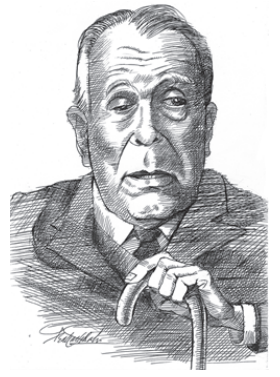
Then, Alifano asks Borges apologetically what blindness meant to him. Borges, in reply, tells him that blindness is a way of life not entirely unhappy. He adds that as a writer he generally believes that all persons must think that whatever happens to him or to her is a resource. He believes that all things have been given us for a purpose and an artist must feel that more intensely. Borges is of the opinion that all that happens to us, including humiliations, misfortunes, and embarrassments are given to us as raw material as clay so that we may shape our art.
Alifano endorses Borges’ idea quoting from Homer’s ‘The Odyssey’. The lines quoted by Alifano are taken from this poem, in which the poet tells the reader that it is the Gods who make man’s life tragic so as to weave a song for future generations to sing. This idea is based on the belief that men write songs in order to soothe the mind when they recall their woes.
After listening to Alifano’s quote from ‘The Odyssey’, Borges adds a little more to highlight the same idea of man’s life being troubled by many undesirable events. Borges tells Alifano that in one of his poems he has said that ‘humiliation’, ‘misfortune’, and ‘discord’ were given to us that we may change them and using our miserable circumstances create works which last forever. Then he quotes from Goethe, “All that is near becomes far”. Here again, Borges is referring to the loss of his eyesight.
In the line quoted here, Goethe is referring to the evening twilight when the things closest to us seem to move away from our eyes. Borges is quoting this line to tell Alifano that the visible world has moved away from his eyes forever. Borges then adds that his eyesight has been replaced by many other things. Then he tells Alifano that it is his duty to accept blindness and still enjoy it as far as possible. Therefore, he tells Alifano that he still continues to pretend that he is not blind and buys books, to fill his house with.
Alifano, hearing him mention ‘Books’, asks Borges to speak about the theme of books. In reply, Borges tells Alifano that he had a very strange dream in which he had seen the library of Alexandria burning, its countless volumes attacked by flames. Then he asks Alifano whether he believes that his dream has any meaning. Alifano replies that it may have some meaning, but then continues his interview asking Borges whether he has ever thought of writing a book on the history of the ‘book’.
Borges tells him that he won’t be able to write such a book though it is an excellent idea. He wonders whether an eighty-three-year-old man can set such a project for himself. Incidentally, Borges tells him that he will keep it in his mind. Then Borges tells Alifano that Spengler has already made an effort in this regard in his ‘Decline of the West’.
In this book, Spengler has made a remarkable comment on books. Then Alifano refers to Borges’ comments (in one of his essays) about the words of Bernard Shaw, in which he has declared “Every book worth being re-read has been written by the spirit”.
Borges agrees with him and tells him that a book goes beyond its author’s intention, which may not be right. Borges declares that in every book there is a need for something more, which is not easy to understand. Then he gives the example of an ancient book. He tells Alifano that when one reads an ancient book one feels as though he or she was reading about all the time that has passed from the day it was written to his present day.
Borges concludes saying that a book always retains something sacred, something mortal, something magical which brings happiness. Then, Alifano asks Borges to define poetry. In reply, Borges says that poetry is something so intimate, and so essential that it cannot be defined without being oversimplified. If one attempts to define poetry it would be like attempting to define the colour yellow, love, and the fall of the leaves in autumn. Borges then states that poetry is not the poem but it is the aesthetic act, the poetic act that takes place when the poet writes it when the reader reads it and it always happens in a different manner. Then he adds and says that when the poetic act takes place, we become aware of it. He then concludes declaring that poetry is a magical, mysterious, and unexplainable, although not an incomprehensible, event.
He feels that the poet should be deemed to have failed if one does not feel the poetic event upon reading it. Alifano then adds telling Borges that the important thing in the art of poetry is finding the precise words. Borges agrees with him. He then states that precise words elicit the emotion. He quotes the line “This quiet dust was gentlemen and ladies” from Emily Dickinson’s poem to illustrate his statement.
Alifano then asks Borges to explain the concept of metaphors. Borges tells him in reply that true metaphors have been there in existence since the beginning of time. Then he tells him that he has occasionally thought of reducing all metaphors to five or six essential metaphors.
Borges is of the opinion that these essential metaphors are found in all literature, apart from many others which are whimsical. Borges then tells him that the poet has to discover metaphors, even though they may already exist.
Finally, Alifano asks Borges to comment on the statement “modern developments in communications will replace books with something more dynamic that will require less time than reading”.
Borges tells him that books will never disappear. Then, he declares that among the many inventions of man, the book is undoubtedly the most astounding, and all the others are only extensions of our bodies. He opines that the telephone is the extension of our voice; the telescope and the microscope are extensions of our sight, and the sword and the plough are extensions of our arms. He asserts that only the book is an extension of our imagination and memory.
Then Alifano asks Borges his reactions to his own statement, ‘Literature is a dream’. Borges assertively tells him.that it is true. He restates his statement ‘Literature is a dream’, and says that it is a ‘controlled dream’. Then he says that it is his belief that we owe literature almost everything we are; what we have been, and also what we will be and ends saying “Our past is nothing but a sequence of dreams.” He concludes remarking that there can be no difference between dreaming and remembering the past. Then he declares, “Books are the great memory of all centuries and their function is irreplaceable. If books disappear, history will disappear and surely the man would disappear”.
Believe that Books will Never Disappear Summary in Kannada
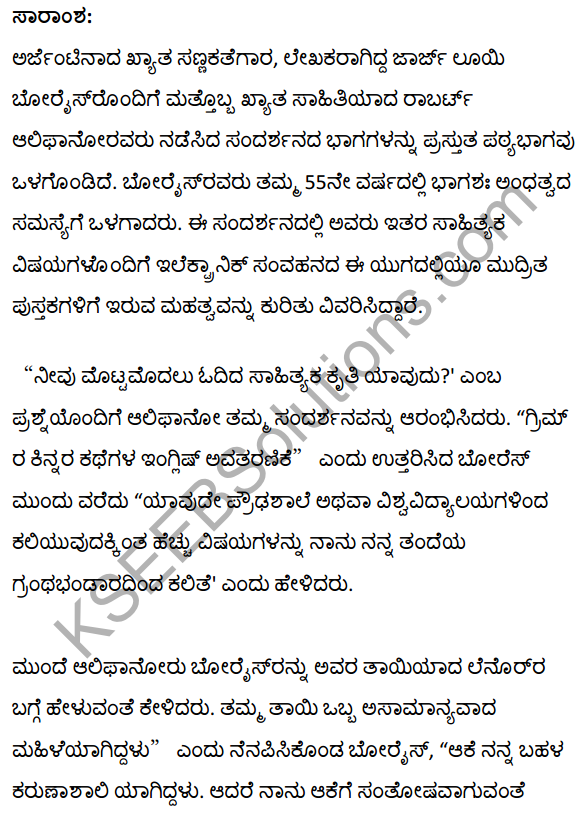
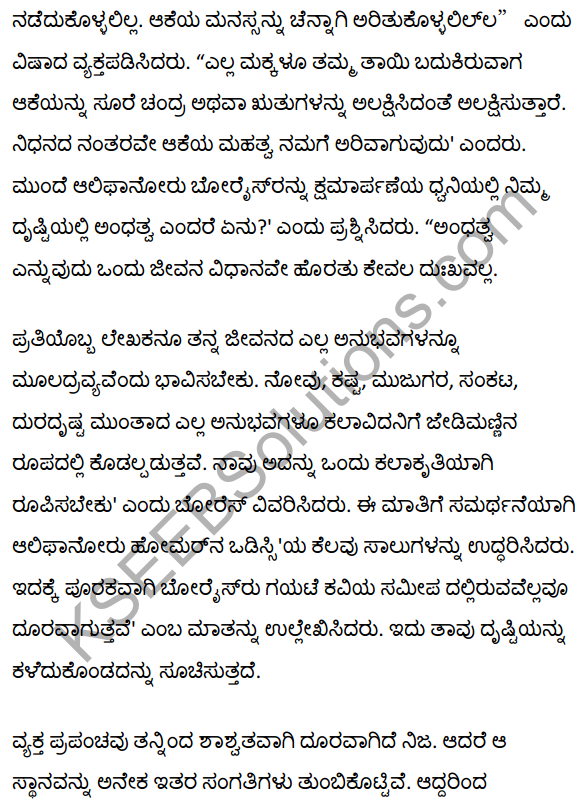
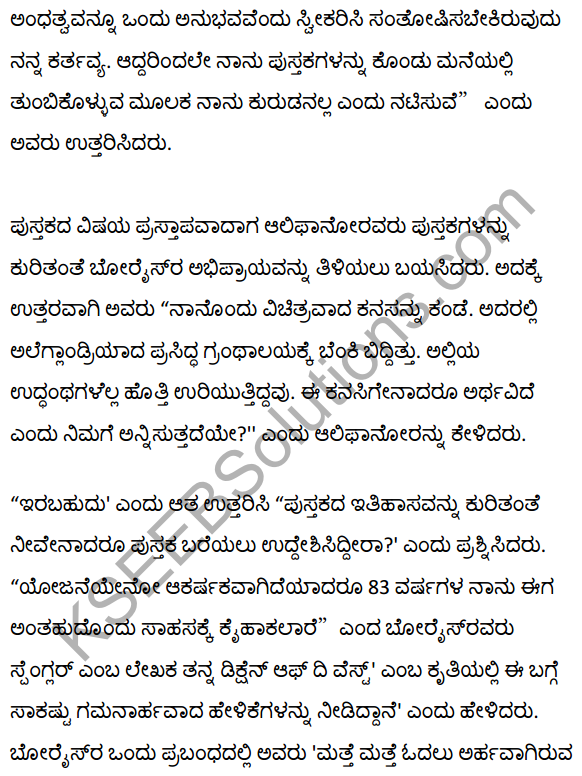
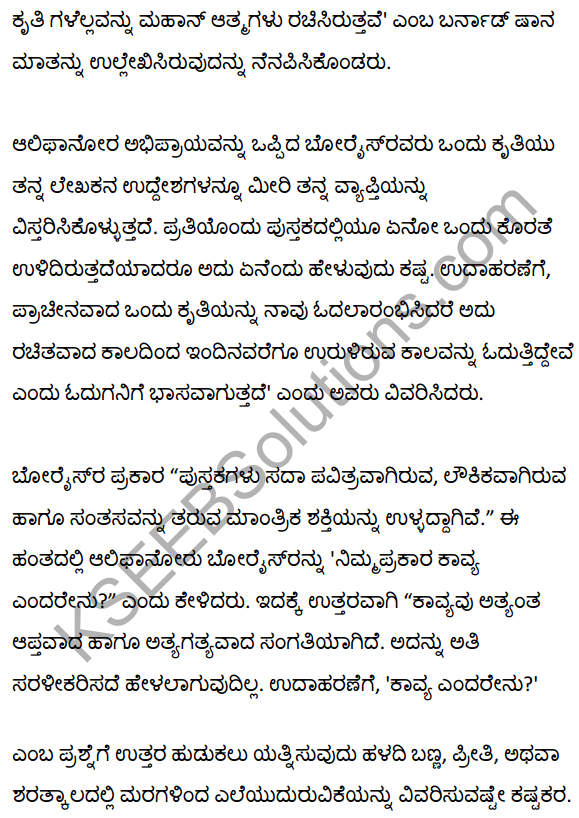

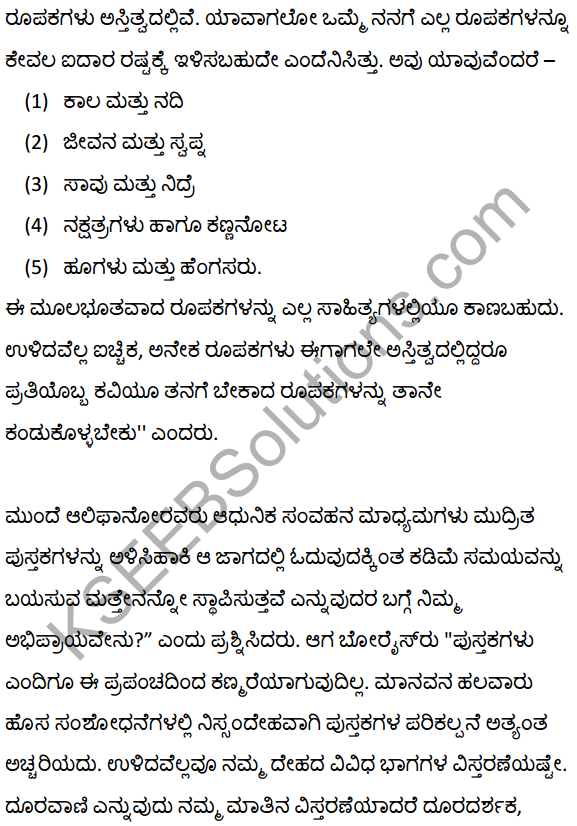
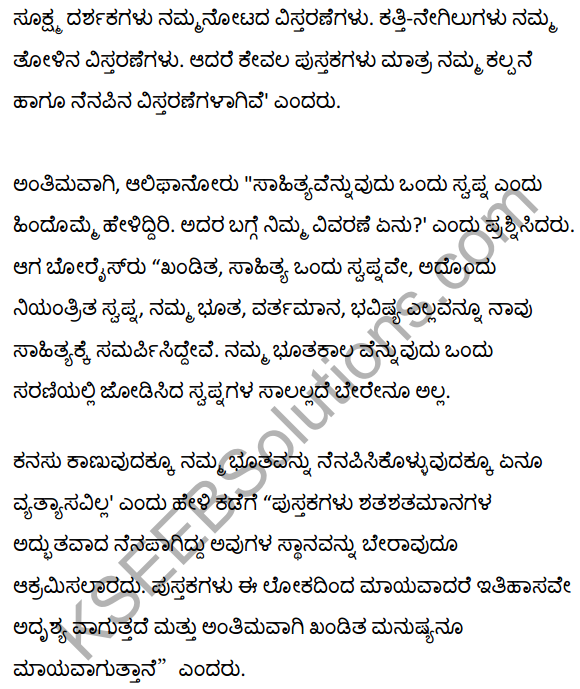
Glossary:
- Dona: used as a courtesy title before the name of a woman in a Spanish-speaking area
- Whimsical: fanciful
- Odyssey: Greek epic written by Homer
- Library of Alexandria: one of the largest libraries of the ancient world which was burnt
- Spengler: Oswald Spengler (1880 – 1936), German historian and philosopher.
Get the quick tips to improve English with the help of Karnataka 2nd PUC English Chapter Wise Notes. One of the simplest approaches to learn English is KSEEB 2nd PUC English Chapter 9. Follow Karnataka Secondary Education Examination Board 2nd PUC Notes for better practice. Download KSEEB 2nd PUC English Solutions PDF for free. Karnataka 2nd PUC English Chapter 9 I Believe that Books will Never Disappear notes for quick preparation of exams. Note down all the key points and begin your learning to get the best results in the exam. Karnataka 2nd PUC English includes chapter wise explanations for all the topics.